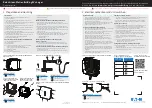
50
The higher the internal resistance of the battery, the worse the voltage
curve under load conditions, and the more dissipated power is con-
verted into heat within the cell and at the parasitic transfer resistance
points. At high currents parasitic resistances in the mOhm range can
certainly cause considerable voltage losses at the motor or other
consumer.
The Ri function can also be used as a straightforward means of
measuring internal resistance in the system as a whole. First set the
pulse current, then press the “OK / Menu” button again to move to
the main Ri measurement function window. Confirming again initiates
the measurement function (Fig. 23).
When you start this function, ten values are recorded in sequence, at five-second intervals, and the
results are displayed on the screen: the measured internal resistance is shown in the lower graphic
area of the screen, while the top half of the screen displays the battery voltage in the zero-load state,
the voltage under load, and the pulse current which is actually flowing.
The Ri measurement function concludes automatically, after which the last recorded measured values
continue to be displayed on the screen. If you wish to record a further series of ten measured values
under the same conditions, simply press the “OK / Menu” button once more.
When Ri values are actively being measured, the bottom section of the screen indicates this (count-
down to the next measured value).
If you wish to change the pulse current for the internal battery resistance measurement process,
simply press the “
fl
” button briefly: you can then set the desired current (in increments of 500 mA)
using the jog dial, and confirm your selection by pressing the “OK / Menu” button. When you initiate
the process again, the internal resistance will be measured using the new set current.
Press the “
‡
” button to conclude the battery Ri measurement function; confirm your selection by
pressing “OK / Menu” again, and you are returned to the “Main Menu”.
Note: optional measuring cable required.
Fig. 23: Main Ri measure-
ment function window









































